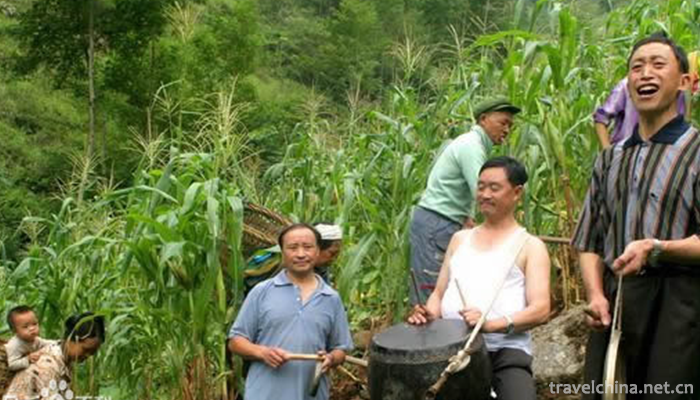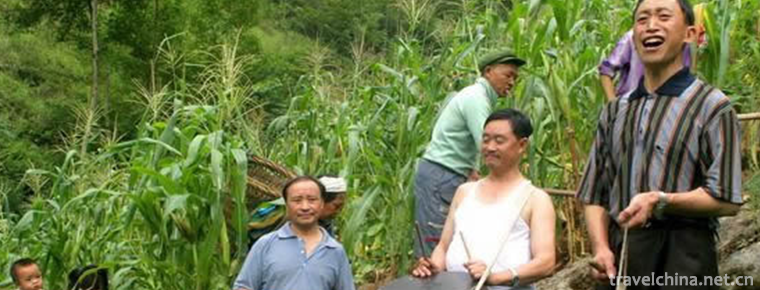Grass grass drums and drums
Grass grass drums and drums
Grass gongs and drums, also known as grass chants, are commonly known as "hilarious songs". It is a unique form of folk song art. It is a kind of Tujia folk song that the Tujia people gather dozens or even hundreds of people to do collective work during the weeding season, and ask two singers to beat a drum and a gong to face the people who weed and roar along with the rise and fall of the gong and drum. It is an important part of Youyang Ancient Song, a national intangible cultural heritage.
On June 7, 2008, Laocao gongs and drums were listed in the second batch of national intangible cultural heritage list with the approval of the State Council.
History
Wushan "grassland Gong and drum" is a unique form of folk song art. It mainly distributes in Shuanglong Town, Miaoyu Town, Muoping Town, Dachang Town, Longjing Town, Liangping Township and other townships. It is said that it originated in the Ba people period more than 3000 years ago. At that time, people changed from fishing and hunting to farming, beating drums and shouting to drive away wild animals and worship mountain gods, and then evolved into a kind of work folk song.
In the book Sancai Tu of Ming Dynasty, it is recorded that there are gongs and drums in Litian, whose voice is vigorous and vigorous, and its voice is slow and restrained.
During the Republic of China, "Xuanhan County Chronicle" records: "The Tumin people have the custom of"picking grass, Gong and drum"since ancient times. In summer weeding, several families turn to one another, and work in turn for the next week, often gathering dozens of people, two of them beat drums and bowls, corresponding to each other, the workers work hard and forget fatigue, their merits are more than double."
Intangible cultural heritage
In 1982, the cultural authorities of Sichuan Province organized musicians from all over the province to collect and collate Bashan folk songs represented by grass gongs and drums, and published an album. In March, the Tujia folk song "Grass, Gong and drum" in Xuanhan County was listed in the first batch of intangible cultural heritage protection list in our province.
On June 14, 2008, the intangible cultural heritage of Xuanhan County, "Tujia Tujia Grass Drum in Eastern Sichuan" was approved by the State Council of the People's Republic of China as the "List of the First National Expansion Projects of intangible cultural heritage".


-
1.The Temple House Bo she Hotel
Located in Chengdu, the Bosch is a luxury hotel with a unique style, which combines the beauty of traditional and modern design. The shape design is charming and energetic, reflecting the city's legen
Time 2018-12-16 -
2.Huhu Water Eco Scenic Spot
Located in the southwestern edge of Pingshan County, Hebei Province, the old revolutionary area, the Biaoshui Eco-Scenic Spot has a tourist area of 11.5 square kilometers, an altitude of 800-1100 mete
Time 2019-01-12 -
3.Tianjin Italian Style Area
Tianjin Italian Style Area is located in Hebei District of Tianjin City. It is a quadrangular area surrounded by Wujing Road, Boai Road, Shengli Road and Jianguo Road in Hebei District. There are near
Time 2019-02-21 -
4.Tibetan Paper making Techniques
Tibetan paper-making technology, Tibetan Autonomous Region's traditional handicraft, one of the national intangible cultural heritage. Tibetan paper-making skills are usually made by peeling
Time 2019-04-15 -
5.Spring Festival
The Spring Festival, the Lunar New Year, is the first year of the year and also the traditional "New Year's Day". Commonly known as New Year, Spring Festival has a long history
Time 2019-04-22 -
6.Brewing technology of soy sauce
Qian Wanlong soy sauce brewing technology is the traditional soy sauce brewing technology of Shanghai Bengang, and it is an ancient local traditional handicraft technology.
Time 2019-05-06 -
7.Gongs and drums
Gong and drum zaju, also known as "zaju of Gong and drum" and "long Yan zaju", is one of the local traditional dramas in Shanxi Province and Henan Province and one of the national
Time 2019-05-15 -
8.Qijia Yanxi
"Qijia Yanxi" is a long narrative poem in Tu folk literature. It records the eleventh generation of Qi Tusi Chief Qi Yanxi in the history of Tu people, despite his old age and physical decli
Time 2019-06-10 -
9.Traditional Cuisine Skills of Shanghai Bengang Cuisine
Benbang cuisine is a nickname for Shanghai cuisine and an important school of Han traditional catering culture in Jiangnan area. The so-called Ben Gang is local. It is characterized by thick red sauce
Time 2019-06-13 -
10.Yuejiaquan
Yuejiaquan is one of the traditional Chinese boxing which has been handed down completely in China. It was founded by Yue Fei, a national hero, according to his own learning and combating with the ene
Time 2019-07-16 -
11.Sports in Panzhihua
By the end of 2018, Panzhihua had 21 stadiums (gymnasiums), 56 sports social groups at all levels, 694 national fitness routes and 263 social sports guidance stations. The city's various sports teams won 80 gold medals, 91 silver medals and 72 bronze medals in provincial competitions. 124 national fitness activities were held throughout the year, with 460000 participants.
Time 2020-12-14 -
12.Dazhou social security
In 2019, the per capita disposable income of Dazhou residents is 22995 yuan, an increase of 10.1%. The per capita disposable income of urban residents was 33823 yuan, an increase of 9.5%. Among them, salary income was 18783 yuan, an increa
Time 2020-12-20